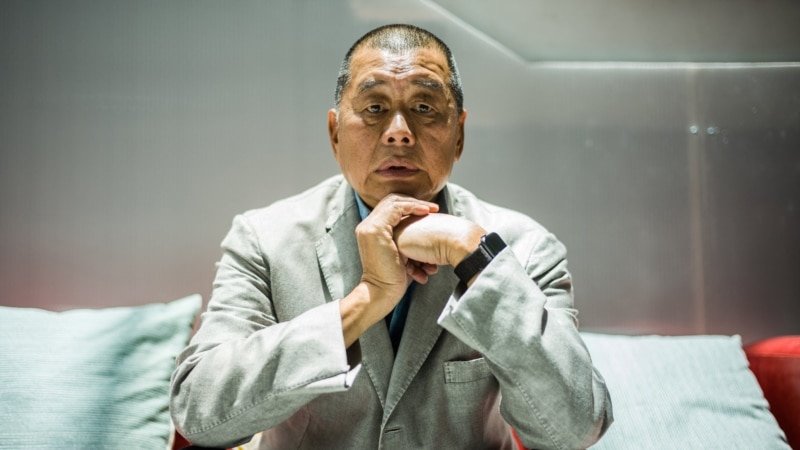
Jailed pro-democracy publisher Jimmy Lai testified on Tuesday that the Hong Kong government has become “very strict” after Beijing imposed its national security law in 2020.
The 77-year-old British national made the statement when the court asked him to explain comments he made following the arrest of former pro-democracy lawmaker Lam Cheuk-ting in August 2020.
At the time, Lai said the arrests showed that the Beijing-imposed national security law, or NSL, “has definitely destroyed our rule of law.” Lam was found guilty of rioting last week.
“I think the NSL has, you know, influenced the way the government administers the law,” Lai told the court on Tuesday. “After NSL, the government has become very strict in using the law.”
Founder of now-defunct apple daily The newspaper is accused of collusion with foreign powers and treason under Beijing’s national security law. He rejects the allegations, which press freedom groups have described as politically motivated.
“This trial is a complete sham,” Yaqiu Wang, China research director at the nonprofit Freedom House, told VOA.
According to analysts, Lai’s plight is a feature, not a bug, of the current press freedom landscape in Hong Kong.
Analysts say the past year has been particularly devastating for media freedom in what was once considered a bastion of press freedom in Asia, as evidenced by Lai’s trial, a new national security law and Points to other trials of journalists. The scenario in Hong Kong is continuously worsening.
“This is a continuation of the dramatic decline in press freedom in Hong Kong,” Wang said.
Several experts told VOA that next year is unlikely to be better.
Lai’s trial began in December 2023 and was initially expected to last about 80 days. But now, his year is about to end the same way it began: attending a trial in a case that could send him to life in prison.
Jimmy Lai’s son Sebastian Lai has consistently expressed concern about his father’s health. The elder Lai has been held in solitary confinement since late 2020.
Sebastian Lai told VOA in November, “His health has deteriorated, as you might expect when you put a 77-year-old man in solitary confinement for four years. But his spirit is strong. His mind. Is strong.”
Caoilfhionn Gallagher, head of Lai’s international legal team, says Lai’s case is aimed at scaring others in Hong Kong from criticizing the government.
Gallagher said, “His case was designed to send a chill down the spine of anyone who wanted to wear a T-shirt or sing a song or post a tweet or say anything that might stand against the leaders of Hong Kong or Beijing. Is.” A press conference in Washington in November.
In late November, a Hong Kong government spokesperson told VOA that it was “inappropriate” to comment on Lai’s case as legal proceedings are ongoing. Hong Kong officials have previously denied that Lai’s prosecution was unfair.
The spokesperson also said that Hong Kong “rejects any fact-breaking remarks and baseless imputations against the legal system” and stressed that “Hong Kong citizens enjoy freedom of the press and freedom of speech “
Lai’s trial is part of a broader pattern when it comes to press freedom in Hong Kong.
In August, two editors – Chung Pui-kuen and Patrick Lam – have now been laid off. stand news He was convicted of treason and later sentenced to prison.
Like Lai, that case was seen as a sign of the poor state of press freedom in Hong Kong, according to Sophie Richardson, a visiting scholar at Stanford University.
“The cases are a very clear message to journalists that they cannot expect the protections of the law to guarantee their free speech rights to practice journalism without fear of retribution,” Richardson told VOA.
In November, 45 pro-democracy activists were sentenced to prison under the national security law. And in September, the Hong Kong Journalists Association reported that dozens of Hong Kong journalists and their families had faced harassment since June.
Mark Clifford, who recently published a biography on Jimmy Lai, told VOA, “If you cross the government you are not safe.”
The developments come against the backdrop of a new, domestic national security law, known as Article 23, which expands on Beijing’s national security measures.
Enacted in March, Article 23 covers sedition, treason and state secrets, and allows for hearings behind closed doors.
Experts have warned that the law is likely to further degrade press freedom and other civil liberties in Hong Kong.
“Almost any conduct can now be labeled a national security threat,” said Richardson, the former China director of Human Rights Watch.
Wang said the law could also highlight insecurity on the part of the Chinese and Hong Kong governments.
“They feel the need to get more tools to suppress the people,” Wang said.
In 2019, before Beijing’s national security law was imposed, Hong Kong ranked 73rd out of 180 countries in the global press freedom index. In 2024, it was ranked 135th – a drop of more than 60-places.
According to Clifford, chairman of the Freedom Committee in Hong Kong, the rapid decline in press freedom and broader civil liberties has fundamentally changed the identity of Hong Kong, whose population had long celebrated its independence.
“It’s surreal. It’s painful,” Clifford said. “I don’t think we’ve seen any other country or city in the last 100 years that had its freedoms lost so quickly and so completely.”